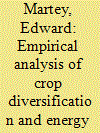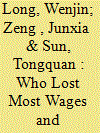|
|
|
Sort Order |
|
|
|
Items / Page
|
|
|
|
|
|
|
| Srl | Item |
| 1 |
ID:
185712


|
|
|
|
|
| Summary/Abstract |
Despite the importance of energy in countries' economies, the vast majority of people, especially in developing countries, live under the energy poverty line. To mitigate this trend, several policy options have been enacted to promote the use of clean and modern fuels given the targets set out in the Sustainable Development Goal Two (SDG2). However, there is a lack of systematic empirical evidence on how crop diversification can alleviate energy poverty in developing countries. This study used the seventh round of the Ghana Living Standard Survey (GLSS 7) to test the effect of crop diversification on the multidimensional energy poverty index (MEPI). I employ the instrumental variable (IV) and the Lewbel two stage least squares (2SLS) techniques and perform several robustness checks to address the potential endogeneity in crop choices. The estimates show that crop diversification is associated with a 0.829 standard deviation decreases in household energy poverty. The effect is prominent for urban and high-income earning households. Household income is identified as the main potential channel through which crop diversification influences energy poverty.
|
|
|
|
|
|
|
|
|
|
|
|
|
|
|
|
| 2 |
ID:
149989


|
|
|
|
|
| Summary/Abstract |
This article describes the electricity consumption in Brazilian residences between 1985 and 2013 through linear regressions. The explanatory variables considered were the number of households, effective consumption of families as a proxy for family income, and electricity tariff for households. To deal with the power generation crisis of 2001 we have introduced a dummy variable in the form of a step function. With such explanatory variables, we were able to account for the reduction of household electricity consumption caused by the policies conducted in 2001 and their permanent consequences. The regression presented coefficient of determination of 0.9892, and the several statistic tests conducted assured the existence of long-term relation between the electricity consumption in residences and the explanatory variables. The obtained elasticities for the household consumption of electricity with respect to number of residences, family income and residential tariff of electricity were 1.534±0.095, 0.189±0.049, and −0.230±0.060, respectively. These results allowed understanding the evolution over time of the household consumption of electricity in Brazil. They suggest that the electric sector in Brazil should pursue an active policy to manage demand of residential electricity using tariffs as a means to control it.
|
|
|
|
|
|
|
|
|
|
|
|
|
|
|
|
| 3 |
ID:
132652


|
|
|
|
|
| Publication |
2014.
|
| Summary/Abstract |
The petroleum sector contributes substantially to the Nigerian economy; however, the potential benefits are diminished due to the existence of significant subsidies on imports of petroleum products. Subsidies on imported petroleum products are considered to be an important instrument for keeping fuel prices, and hence the cost of living, low. The costs of these subsidies, however, has risen dramatically in recent years due to increased volatility in world petroleum and petroleum product prices and increased illegal exportation of subsidized petroleum products into neighboring countries. Removing the subsidy on fuel is one of the most contentious socio-economic policy issues in Nigeria today. In this paper, an economy-wide framework is used to identify the impact of removing the fuel subsidy on the Nigerian economy and investigates how alternative policies might be used to meet socio-economic objectives related to fuel subsidies. The results show that while a reduction in the subsidy generally results in an increase in Nigerian GDP, it can have a detrimental impact on household income, and in particular on poor households. Accompanying the subsidy reduction with income transfers aimed at poor households or domestic production of petroleum products can alleviate the negative impacts on household income.
|
|
|
|
|
|
|
|
|
|
|
|
|
|
|
|
| 4 |
ID:
163333


|
|
|
|
|
| Summary/Abstract |
In theory, off-farm work, by raising household incomes, can have a direct impact on smartphone use among rural residents and the use of these smartphones in turn enhances incomes by facilitating online financial transactions, easing management tasks, strengthening social networks, providing technical services, and reducing exposure to risks. In light of this, this paper assesses the impact of participation in off-farm work on smartphone use, using an endogenous switching probit model and a survey of 493 rural households in China. The joint impacts of off-farm work participation and smartphone use on household income are also analyzed using a control function method. The results show that participation in off-farm work increases the probability of smartphone use significantly. Furthermore, we find that the household heads who engaged in off-farm activities and who were smartphone users earned 3430 Yuan and 2643 Yuan more per capita annual income, respectively, compared to their full-time farming and smartphone-free counterparts.
|
|
|
|
|
|
|
|
|
|
|
|
|
|
|
|
| 5 |
ID:
182581


|
|
|
|
|
| Summary/Abstract |
China managed to eliminate all extreme poverty in rural areas in 2020. Poor households, however, may risk falling back into poverty due to the COVID-19. This paper examines the impacts of the pandemic on wages and household incomes among different groups in poor areas of rural China. Using a unique dataset from five poverty-stricken counties, we found that the pandemic has had large negative effects on wage income for migrant workers and workers in manufacturing, the private sector, and small enterprises. Compared with households relying on wage income, households relying on small businesses have suffered much more from the pandemic, whereas households depending on farming or transfer payments have been less affected. Although poor and ethnic minority households lost significant amounts of wage income due to the pandemic, they did not lose more household income than nonpoor and nonminority households. We conclude that support from the government has kept vulnerable households from suffering more than other households from the effects of COVID-19. Our findings suggest that the government can play a strong role in alleviating the negative impacts of the COVID-19.
|
|
|
|
|
|
|
|
|
|
|
|
|
|
|
|
|
|
|
|
|